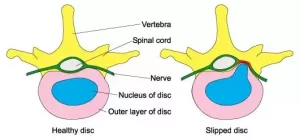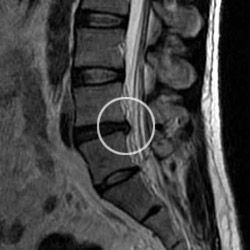When should I see a doctor about back pain?
Back pain red flag symptoms
Sometimes back pain is a sign of a more serious problem. Here are some ‘red flag’ symptoms that are a concern. If you have these as well, it is important to see a doctor soon.
- Age <18 years and >60 years
- Bladder, bowel (inability to control your wee-ing or poo-ing) or sexual dysfunction
- Weakness or loss of sensation in the legs or arms
- Fever or weight loss
- Pain at night
- Trauma, or recent back surgery or epidural
- Other diseases – e.g. cancer, TB or HIV
- Drugs – including, anticoagulants, immunosuppression (drugs that suppress the immune system) and IV recreational drugs
- Severe new pain lasting over two weeks.
Here are two important causes of back pain. If you think you may have either, you need to see a doctor, possibly today.
What is a prolapsed (‘slipped’) disc?
A ‘slipped disc’ occurs when the gel-like centre of one of the cushions between the vertebrae (building locks of spine) escapes from its outer casing. A fragment may cause pressure on one or more of the nerves which supplies the legs causing leg or bottom pain (‘sciatica’). As with most low back problems, the vast majority will rectify themselves with time.
 Prolapsed disc
Prolapsed disc

Spinal MRI: Prolapsed disc touching spinal nerves (not everyone needs an MRI)
In fact, 90% are better by six weeks. Those cases of sciatica which do not resolve with time and exercises, may benefit from an ‘epidural’ injection of anaesthetic and steroid medication.
This can be a useful test both to confirm the cause of pain, and to provide long enough symptomatic relief for the problem to rectify itself.
Surgery to decompress the nerves may be offered when conservative treatment (rest, injections etc) has failed.
Normally this can be done through a small cut in the lower back but it does carry some risk. Rarely, metal implants may be recommended if there is an underlying instability of the spine.
Spinal Cord Compression/Cauda Equina Syndrome
In extreme circumstances, compression of the nerve roots in the lower back which supply the legs, bowel and bladder can result in a conditions called ‘spinal cord compression’ or ‘cauda equina syndrome’. Urgent surgery is usually indicated.
So if you have a rapid onset of severe back pain (especially if it spreads into both legs) associated with leg weakness and/or bowel, bladder or sexual dysfunction, you should go to your local A+E Department. Do not wait for appointment with your GP or anyone else.
After that, you need an MRI and to see a senior orthopaedic or neurosurgical doctor (consultant or registrar) ASAP, to plan an operation that may need to be done soon.
Do I need to see a doctor or physiotherapist?
Often a physio is the best person to see initially. Many GPs have someone called a NHS musculoskeletal (MSK) ‘first contact physio’ (therapist) you can see, without seeing your GP at all. See if there is one at your local surgery.
Many MSK physiotherapists operate a self-referral pathway online, or by telephone – i.e. you do not have to see the GP first.
They will be able to assess your symptoms, examine you, and recommend some useful exercises to help to alleviate pain – and organise an MRI if needed.
They will also be able to arrange any necessary investigations and onward referral to a specialist (a spinal surgeon) if necessary.
How long should I wait for, before I see a doctor or physiotherapist?
If you have new back pain (and it is not too severe), unless you have one of the red flag symptoms below, it is often best to wait two weeks before seeking help, as it often corrects itself.
Do I need to have an MRI or see an orthopaedic or neurosurgeon?
A large majority of people with back pain do not need an MRI, or to see a spinal surgeon (e.g. neurosurgeon or orthopaedic surgeon).

